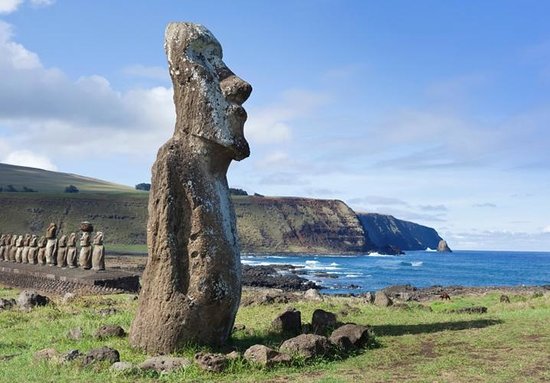Vast amounts of timber would have been required to transport and erect the giant moai,
用于传送和耸立摩艾的大量木材是心不可少的
and slowly but surely, the forests vanished.
森林虽慢却一点点地消失了
Eventually, there was no wood left even to build boats.
最后 甚至没有木材用于造船了
Without fishing boats, they would have been denied their main source of food, and their one means of escape.
没有了捕鱼船 他们就没有了食物主要来源 也无法逃出
As resources dwindled, Easter Island society descended into chaos and warfare.
当资源匮乏时 复活节岛的社会走向了混乱和战争

The giant statues were pulled to the ground...possibly acts of sabotage between rival clans.
巨大的雕像被推翻在地 或许是宗族之间的破坏行为
Houses were abandoned and the foundation stones used to construct fortified dwellings in caves underground.
房子被抛弃 房屋基石用来修建加固在地下洞穴里的居处
Some evidence even suggests that once everything edible had been consumed,
甚至有迹象证实岛上任何可吃的都耗尽了
the starving were driven to that most desperate of acts—cannibalism.
饥饿将产生不顾一切的行为——同类相食
Understandably, this version of Easter Island's history remains controversial,
可以理解这个版本的复活节岛 历史留有争议
because it suggests the Rapa Nui were incredibly short-sighted.
因为它暗示复活节岛上的人类 竟然是鼠目寸光
As the trees dwindled, why did they do nothing about it?
当树木稀少时 为什么他们什么也不做呢?
But a new theory suggests the Rapa Nui were powerless to prevent their downfall,
有一个新的理论提出复活节岛上的人类 无法阻止他们的没落
for when they arrived on this island, they were not alone.
当它们抵达这个岛上时 他们不再孤独



